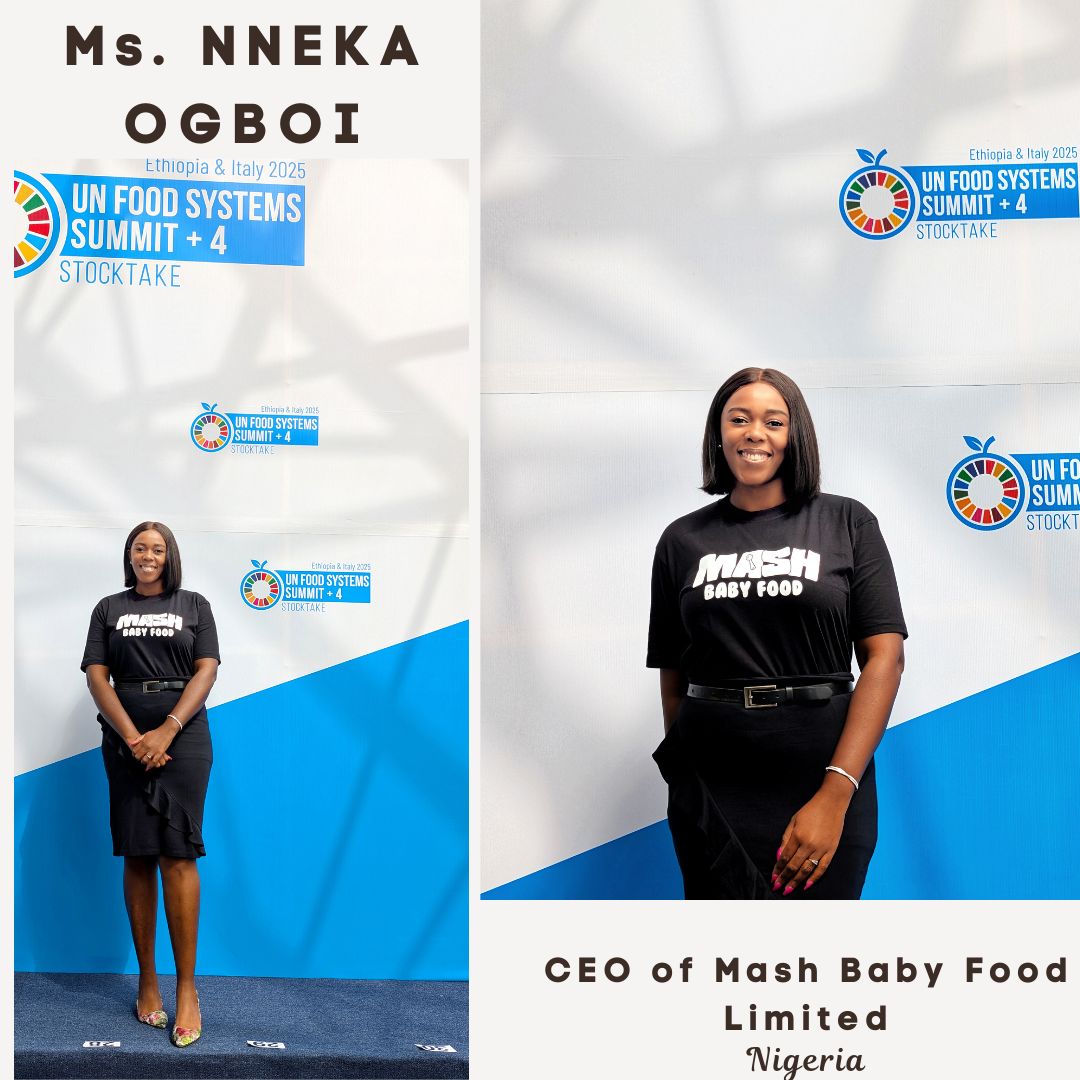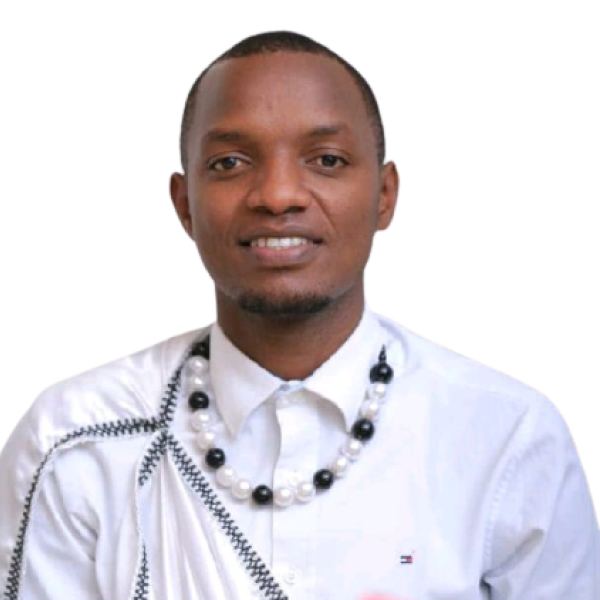Business Engagement at UNFSS+4: The Experience of GAIN supported MSMEs
We invite you to read this interview with Ms. Nneka Ogboi, CEO of Mash Baby Food Limited, sharing her experience from this global forum.
Date: 19th/September/2025
We invite you to read this interview with Ms. Nneka Ogboi, CEO of Mash Baby Food Limited, sharing her experience from this global forum.
Date: 19th/September/2025
The Second United Nations Food Systems Summit Stocktake (UNFSS +4) which held 27–29 July 2025 in Addis Ababa, co‑hosted by Ethiopia and Italy – closed with a powerful reaffirmation of political will, partnership, and accountability in support of sustainable, inclusive, and resilient global food systems transformation. It brought together 3,500+ participants, 145+ national delegations and 700+ non-state actors. Participants from governments, civil society, producers, youth, Indigenous Peoples, academia, and the private sector gathered for Plenary sessions, High-level Panels, Ministerial Roundtables, Investment Dialogues, and Stakeholder-led constituencies.
To address the pressing challenges of food insecurity and malnutrition, we need targeted investment informed by data and evidence on where to invest for impact and results at scale. As part of the UNFSS+4, the World Business Council for Sustainable Development (WBCSD), in collaboration with FAO and the UN Global Compact, were requested by the UN Deputy Secretary-General to convene a Business Engagement Group. This group coordinates inputs and contributions to UNFSS+4, with the aim of mobilizing greater investment and unlocking private sector financing for innovative and entrepreneurial solutions with proven impact for food systems transformation.
In line with this, about 20 Small and Medium Enterprises (SMEs) and entrepreneurs selected by the Business Engagement Group pitched their ideas and presented investment opportunities to government officials, private sector, investors and partners during moderated sessions. The selected SMEs from various regions, presenting on investment opportunities demonstrating tangible contributions across the food systems, that are both impactful and economically viable. Two of these businesses were high impact agrifood enterprises supported by GAIN in Nigeria and Mozambique. Their participation at the summit enabled them to connect, learn, and, most importantly, unlock financing for their growth plans.
We invite you to read this interview with Ms. Nneka Ogboi, CEO of Mash Baby Food Limited, sharing her experience from this global forum.
Nneka: We are a Nigerian company that produces 100% natural, nutrient-dense, complementary meals and snacks for children aged 6 months and above. We have improved childhood nutrition by delivering over 150,000 nutrient-dense complementary meals to young children across Nigeria. With recipes from a wide variety of locally sourced food groups often neglected in children's diets, such as fresh fruits, vegetables, grains, legumes, and animal proteins, we support our community of over 50,000 African parents in nourishing their children during the first 1,000 critical days. Our investment created 12 jobs for young females in the last 3 years.
I went to Addis Ababa to present our plan of three pillars: scaling production, expanding access, and deepening impact. First, we are looking for investors to complete our facility upgrade and semi-automated equipment to increase capacity by 3 times. We’ll also transition to solar-powered operations to reduce Nigeria's expensive and unstable electricity costs and improve sustainability.

Nneka: During the pitching session, I made a few promising connections. I met a representative from a company headquartered in Cambodia that distributes healthy food products across West Africa (date palm, teas, seasoning, probiotics). They expressed interest in exploring how we might fit into their distribution network. We agreed to have a meeting soon to discuss potential partnerships. Additionally, there was a consultant from UNICEF, and we’ve scheduled a meeting to discuss potential areas of alignment or collaboration. While these discussions are at an early stage, both present exciting opportunities.
Nneka: Yes. Several conversations reinforced the importance of exploring alternative preservation techniques to improve shelf life without compromising the nutritional value, especially for markets like ours (Nigeria) with limited cold chain infrastructure. Our primary consideration is freeze-drying, particularly for scaling distribution across low-income areas and for export potential.
Nneka: There was no formal investor financing offers during the session. However, various stakeholders showed interest in learning more about our business model and possible collaborations, and I plan to nurture these contacts for possible future funding or partnership opportunities.
Nneka: I have scheduled two follow-up meetings already. I also intend to stay in touch with the coordinator of the pitching session, Christine Gould, who invited me to join a network called “Thought for Food”, which connects food entrepreneurs across Africa. This will be useful for further networking and collaboration opportunities.
Nneka: Yes. There is a clear need for enhanced consumer education around the nutritional value of early childhood meals. The conversations also highlighted a growing demand for more affordable, shelf-stable formats of baby food to reach underserved populations. This aligns with our roadmap, which includes developing a freeze-dried product line and low-cost sachet options.
Nneka: Some discussions around regional distribution models and Non-Governmental Organizations (NGO)-private sector partnerships offered great insight. I was particularly intrigued by examples of local producers partnering with large NGOs to get nutritious products into hard-to-reach communities. I would like to explore these models further, especially through collaboration with institutions like UNICEF.
Nneka: Highlight for me was that to deepen our impact, it goes beyond production to include access, education, and consumer behaviour.
One of the findings from the consultant at UNICEF was that even in low-income communities, the parents still like products that seem aspirational, like they are giving their baby the best. So packaging/presentation and continuous education still play a key role in whether they will buy into the product, beyond the nutritional benefits.
These principles will guide our future educational campaigns and community partnerships at MASH Baby Food.
Nneka: After hearing real examples from other regions, such as integrating fortified flours into school feeding programs in East Africa, I see clear opportunities for MASH to evolve.
Aimé Garlas Kwizera, Programme Lead, Nutrition Enterprise Development
Email: [email protected]
Read more about the Business Engagement at the UNFSS+4 HERE

Programme Lead, Nutrition Enterprise Development